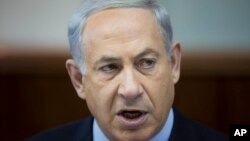JERUSALEM —
Israeli officials have strongly criticized the interim agreement on Iran’s nuclear program reached in Geneva early Sunday. They say it does nothing to stop Iran’s efforts to build nuclear weapons.
Israeli Prime Minister Benjamin Netanyahu condemned the agreement on Iran’s nuclear program a few hours after it was announced.
He said this was not a historic agreement but a historic mistake. Netanyahu said the world had become a much more dangerous place because what he called the most dangerous regime in the world had taken a significant step toward attaining the most dangerous weapon in the world.
Netanyahu added that Israel had the right and duty to defend itself, by itself against any threat. And he said Israel would not allow Iran to develop a nuclear weapon.
Iran and six world powers announced the interim agreement in the early hours Sunday after four days of tough negotiations.
Under the accord, Iran must destroy its stockpiles of near-weapons grade uranium, stop installation of centrifuges used to enrich uranium and stop construction of a reactor that would produce plutonium, which is also used to make nuclear weapons.
The agreement also said Iran would agree to unprecedented international inspections to ensure compliance.
In return the accord said the world community would not impose new economic sanctions on Iran for six months. And it would suspend some sanctions on Iranian exports of precious metals, automotive goods and petrochemicals.
The accord is meant to lead to negotiations on a broader agreement in six months.
An analyst at Tel Aviv’s Institute for Defense Security Studies and former official with the International Atomic Energy Agency, Ephraim Asculai, said the agreement addressed many concerns over Iran’s nuclear program. But he was worried about some of the details.
“The major reservation is the breakout possibility has not been negated and the time it would take for Iran to breakout, enrich to 90 percent and produce a first nuclear explosive device has not been prolonged. It is still a rather short time,” he said.
He added that another concern was whether Iran would allow international inspectors to visit all of its nuclear installations, especially a military explosives facility at Parchin, near Tehran.
International inspectors two years ago asked to visit the facility to verify that it was not being used to develop nuclear weapons capabilities. They were denied permission.
Iran says its nuclear program is for peaceful purposes only. It recently allowed inspectors greater access to some nuclear facilities.
Israel and several Western governments have said they retain the option to stage military strikes on any Iranian nuclear weapons installations if they are found to exist.
Israeli Prime Minister Benjamin Netanyahu condemned the agreement on Iran’s nuclear program a few hours after it was announced.
He said this was not a historic agreement but a historic mistake. Netanyahu said the world had become a much more dangerous place because what he called the most dangerous regime in the world had taken a significant step toward attaining the most dangerous weapon in the world.
Netanyahu added that Israel had the right and duty to defend itself, by itself against any threat. And he said Israel would not allow Iran to develop a nuclear weapon.
Iran and six world powers announced the interim agreement in the early hours Sunday after four days of tough negotiations.
Under the accord, Iran must destroy its stockpiles of near-weapons grade uranium, stop installation of centrifuges used to enrich uranium and stop construction of a reactor that would produce plutonium, which is also used to make nuclear weapons.
The agreement also said Iran would agree to unprecedented international inspections to ensure compliance.
In return the accord said the world community would not impose new economic sanctions on Iran for six months. And it would suspend some sanctions on Iranian exports of precious metals, automotive goods and petrochemicals.
The accord is meant to lead to negotiations on a broader agreement in six months.
An analyst at Tel Aviv’s Institute for Defense Security Studies and former official with the International Atomic Energy Agency, Ephraim Asculai, said the agreement addressed many concerns over Iran’s nuclear program. But he was worried about some of the details.
“The major reservation is the breakout possibility has not been negated and the time it would take for Iran to breakout, enrich to 90 percent and produce a first nuclear explosive device has not been prolonged. It is still a rather short time,” he said.
He added that another concern was whether Iran would allow international inspectors to visit all of its nuclear installations, especially a military explosives facility at Parchin, near Tehran.
International inspectors two years ago asked to visit the facility to verify that it was not being used to develop nuclear weapons capabilities. They were denied permission.
Iran says its nuclear program is for peaceful purposes only. It recently allowed inspectors greater access to some nuclear facilities.
Israel and several Western governments have said they retain the option to stage military strikes on any Iranian nuclear weapons installations if they are found to exist.




